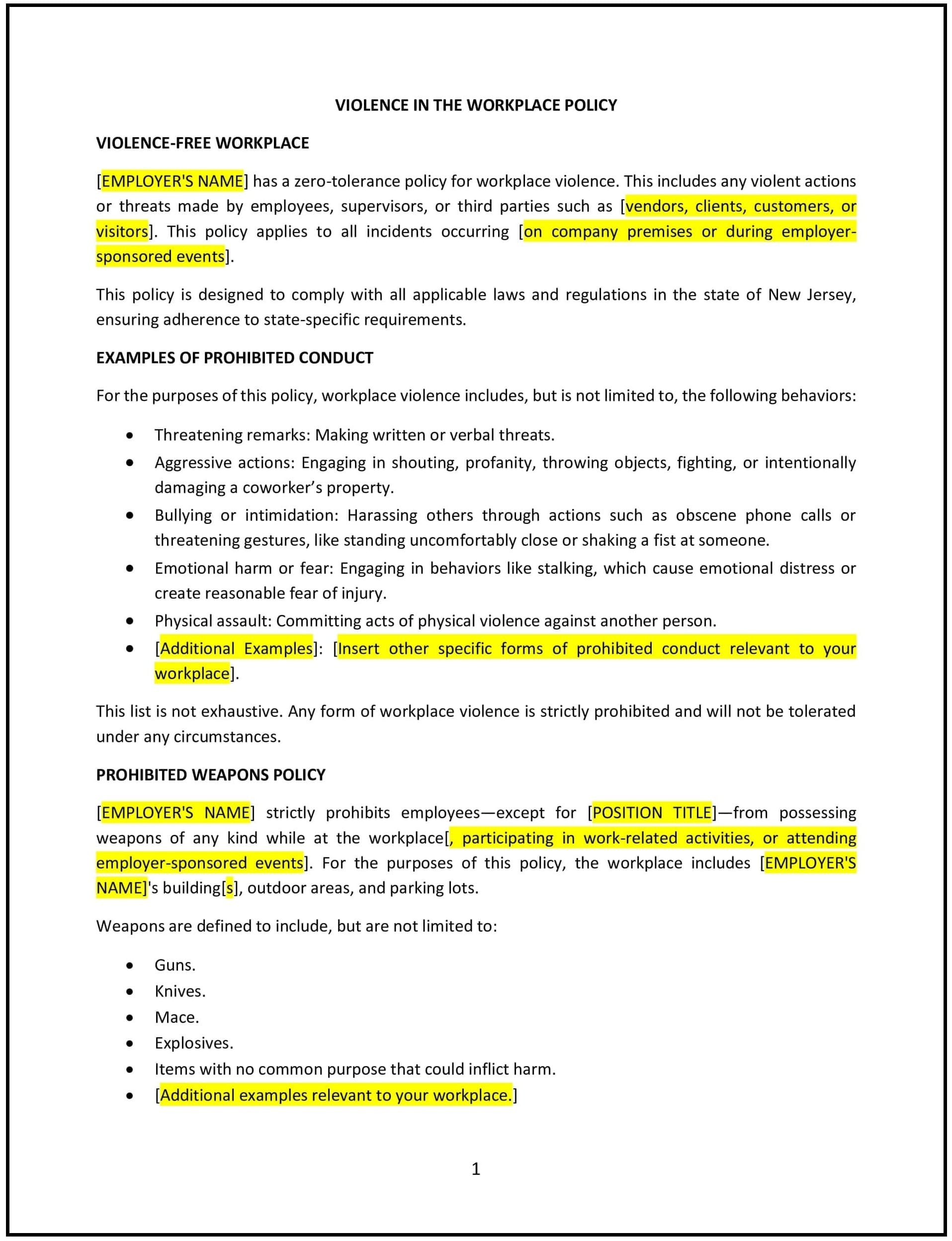Violence in the workplace policy (New Jersey): Free template
Got contracts to review? While you're here for policies, let Cobrief make contract review effortless—start your free review now.

Customize this template for free
Violence in the workplace policy (New Jersey)
A violence in the workplace policy helps New Jersey businesses establish clear guidelines for preventing, addressing, and responding to violent or threatening behavior at work. This policy outlines what constitutes workplace violence, procedures for reporting incidents, and the steps the company will take to maintain a safe and secure environment for employees.
By adopting this policy, businesses in New Jersey can foster a safe and supportive workplace, reduce the risk of violent incidents, and provide employees with the resources they need to address safety concerns.
How to use this violence in the workplace policy (New Jersey)
- Define workplace violence: Clearly define what constitutes workplace violence, including physical violence, threats, verbal abuse, and intimidation.
- Prohibit violent behavior: Establish a zero-tolerance policy for violent behavior, including physical confrontations, threats, harassment, or intimidation in the workplace.
- Set reporting procedures: Outline the process employees should follow to report incidents of violence, including who to contact, how to document the situation, and the confidentiality of reports.
- Provide support for affected employees: Offer resources such as counseling services, employee assistance programs (EAPs), or support for victims of workplace violence.
- Address retaliation: Clarify that employees who report incidents of violence or threats will not face retaliation or negative consequences for speaking up.
- Develop emergency response procedures: Create guidelines for responding to violent incidents, including evacuation routes, contacting law enforcement, and managing the aftermath of an incident.
- Train employees: Provide training for all employees on recognizing warning signs of potential violence, de-escalation techniques, and how to respond if they encounter violent situations.
- Review and update: Regularly review the policy to ensure it reflects New Jersey state laws, evolving business needs, and best practices in workplace safety.
Benefits of using this violence in the workplace policy (New Jersey)
This policy provides several benefits for New Jersey businesses:
- Promotes a safe work environment: Helps create a workplace where employees feel secure, fostering trust, morale, and productivity.
- Reduces the risk of workplace violence: Provides clear guidelines for preventing and addressing violent or threatening behavior, minimizing potential harm to employees and the business.
- Supports employee well-being: Offers resources and support for employees affected by workplace violence, showing a commitment to their health and safety.
- Enhances company reputation: Demonstrates the business’s commitment to maintaining a safe, respectful, and ethical work environment, enhancing its reputation among employees and clients.
- Ensures legal protection: Helps the business comply with New Jersey regulations and reduces the risk of legal liability related to workplace violence.
Tips for using this violence in the workplace policy (New Jersey)
- Communicate the policy clearly: Ensure all employees are aware of the violence in the workplace policy and understand the reporting process and expectations.
- Provide regular training: Offer ongoing training on how to recognize, prevent, and respond to violence in the workplace, emphasizing de-escalation and conflict resolution techniques.
- Promote a supportive environment: Encourage employees to report concerns early and provide support to those affected by workplace violence, ensuring they feel heard and protected.
- Be proactive in addressing concerns: Act on reports of potential violence immediately, taking preventive measures to address risks before they escalate.
- Review the policy regularly: Update the policy to reflect any changes in New Jersey state laws, workplace dynamics, or company procedures.